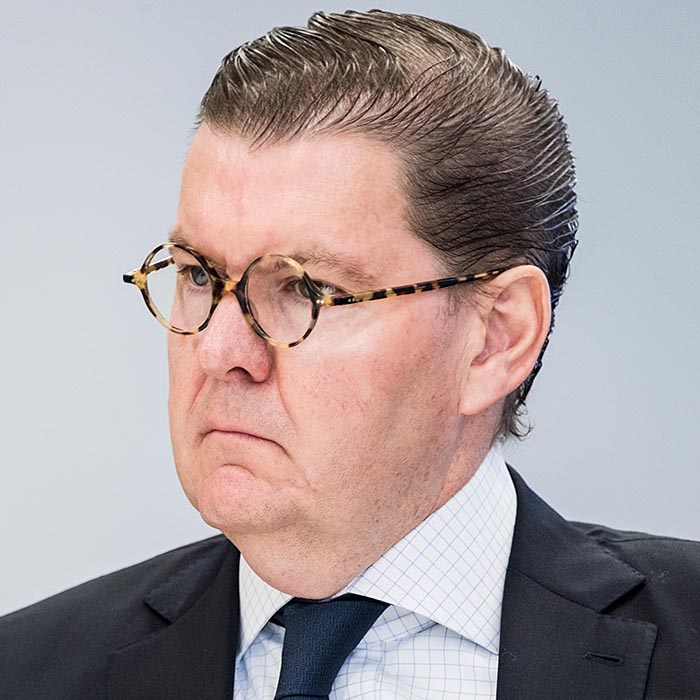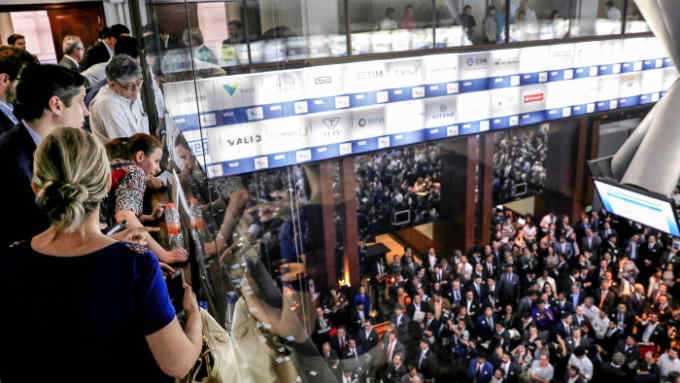Even strident populists must face Brazil’s fiscal reality

Roula Khalaf, Editor of the FT, selects her favourite stories in this weekly newsletter.
The overall market capitalisation of companies listed on Latin America’s largest bourse, BM&FBovespa — recently rebranded as B3 — grew 27 per cent in dollar terms over the year to March, nearly double its low point in 2016.
Mergers and acquisitions have returned. The country’s biggest ever deal, the $14.5bn merger of Brazilian pulp producers, Fibria and Suzano, helped put 2018 on track to be one of the best years for M&A since 2012. This would mark a firm recovery from the country’s deep recession in 2015 and 2016. Equity issuance has also recovered.
Stacked against the markets is the political uncertainty ahead of the presidential elections in October and volatility in emerging markets caused by rising US yields.
Yet leading dealmakers invited to debate the outlook for Brazil’s capital markets brush off such concerns, saying a cyclical recovery in the economy is under way and Brazil’s precarious fiscal straits would impose reform even on the most strident populist.
The FT’s partner in staging the event, consultants FGV Projetos, hosted the roundtable at its offices in São Paulo, Brazil’s business capital.
It was chaired by the FT’s Brazil bureau chief Joe Leahy and hosted by Cesar Cunha Campos, director of FGV Projetos, and Carlos Langoni, senior adviser of FGV Projetos and a former central bank president.

Engaged in the debate were Bruno Amaral, head of M&A at investment bank BTG Pactual; Juca Andrade, vice-president of products and clients at B3; Ana Cabral-Gardner, managing partner at advisers A: 10 Investimentos e Assessoria; Patrice Etlin, managing partner at private equity firm Advent; Bruno Fontana, head of investment banking and capital markets for Brazil at Credit Suisse; and Roderick Greenlees, global head of investment banking at Itaú BBA.

A resurgent market
For Latin American private equity operators, last year saw record activity — with a total of $4.1bn invested in Brazil, accounting for 49 per cent of such investment in the region, according to the Latin American Private Equity & Venture Capital Association.
Patrice Etlin (Advent): Last year for us was the best ever in the region in the 21 years that we have been operating here. We saw a reopening and active IPO market. We saw Chinese buyers pretty aggressive in the [M&A] market and we saw local M&A going on between large [domestic] players.
There is tremendous liquidity in the world chasing interesting opportunities and Brazil is one. The [Brazilian] recession opened tremendous opportunities. Companies that suddenly got into trouble were forced to sell assets to look for liquidity. Then you had parallel to that the Car Wash investigation [Brazil’s biggest corruption probe, principally into bribery at state-owned oil company Petrobras] which forced major construction companies, Petrobras and others to sell assets.
Roderick Greenlees (Itaú BBA): That trend has changed this year, right, because although we did see a lot of the M&A activity driven over the last couple of years by potentially distressed conglomerates, what we have seen this year is more [normal] consolidation . . . companies in the same sector gaining scale to generate synergies. That was the case of Fibria and Suzano, and this week Somos and Kroton [two Brazilian education companies] and M. Dias Branco and Piraque [consumer goods companies].
Ana Cabral-Gardner (A10): The big thing this year was the emergence of the domestic buyer. Once these guys go shopping, they can’t be beaten. Because with due diligence, they can go faster, there’s a lot of tax complexity in Brazil . . . and the domestic player knows that because he’s been doing this for 30-40 years.
Bruno Amaral (BTG Pactual): The market is returning to normal instead of being driven by the recession. So coupled with the low interest rates that we have seen, it’s making players make bets that they wouldn’t have made a year ago.
Bruno Fontana (Credit Suisse): Investors are sitting on a pool of liquidity. They still need to find stories in which to invest, they will be looking for specific trends in the financial sector, they are looking at technology disruption — not only in the financial sector but maybe in education, in insurance, agribusiness etc. So we are cautiously optimistic.


But what about the election?
Brazil has a dizzying array of candidates running for election, from the far-right promising to shoot criminals to leftists struggling to fill the space occupied by former president Luiz Inácio Lula da Silva, who has been sentenced to jail for corruption. Strong centrist candidates are lacking. But Brazil’s huge budget deficits, driven by what many see as an over-generous state pension scheme, mean whoever becomes president will have to confront the need for fiscal reform.
Carlos Langoni (FGV Projetos): My bet is that the next months are going to be difficult for the markets. We have upcoming presidential elections, we have an incomplete internal [budgetary] adjustment. [Michel] Temer [the current centre-right president] did a lot but he was unable to approve the social security [pension] reform.
BA: I think the cyclical economic recovery is unstoppable because the base is so low [because of the recession]. The real question is whether that cyclical recovery is going to be combined with a structural recovery [one driven by reforms implemented by the next president]. If that happens then we are going to see something [a boom] that probably we haven’t seen in years.
RG: In the equity capital markets, I think it will die down towards the elections. But on the M&A front I think we’ll still have a very strong year.
PE: Even if a leftist candidate comes into power starting on January 1, the big difference now is that the country has run out of money. At the end of the day, they are going to have to pay the public sector employees and social security. Some kind of reform will be almost imposed on the agenda.
CL: Pragmatism will prevail over ideology because the state is broke.


The unwinding of Brazil’s carry trade
Brazilian interest rates are at record lows following the end of its recession last year. Meanwhile, US Treasury yields are rising. Foreigners are abandoning a long-running carry trade in Brazil’s currency, in which they brought money into the country to benefit from the high interest rates. The Brazilian real has been weakening against the dollar. Domestic investors, too, are being forced to look for alternatives to government treasuries because of the falling rates. Can Brazil continue to attract the foreign capital it needs for economic growth?
Juca Andrade (B3): Hopefully, we will have a scenario where lower rates stay. A lot of people are going to turn to other asset classes [away from government treasuries].
ACG: The world’s changed. It’s no longer just about US rates moving. Now there’s a semi-ideological component mainly in China — you see this capital mainly going [from China] to emerging economies.
BA: Not underestimating the impact of higher rates in the US, it’s not a surprise, it’s not a shock — people have been able to plan for that. Second, it’s been counter-balanced: the Asia factor; interest from [foreign] companies in [Brazilian] assets.
RG: The equity capital markets have benefited from the lower interest rates, better economic prospects. In the past year, we had maybe 25 or 26 equity offerings priced in Brazil and 12 IPOs. In the three years before, we had one IPO a year.
BF: At the end of the day, investors will continue to look for yield, for ROI [return on investment]. If we are able to bring to the market companies with stories that follow that rationale, there will be interest from investors not only locally but also globally.
PE: What investors are buying now is growth. When that growth is not there, the penalisation is huge, so we are seeing a lot of volatility and stocks going down 10-15 per cent over a missed quarter.
Legal certainty and risk capital
Brazil needs to do more to establish legal certainty in sectors such as mining and energy and make it more attractive for smaller companies to come to market to encourage start-ups and the tech sector. If a populist government comes to power, there are fears that there could be sudden nasty surprises, such as occurred in 2012 in the energy sector when former leftist president Dilma Rousseff sought to impose price reductions on producers.
ACG: Left or right, I don’t have any views but whoever [is president] there has to be legal certainty. China is a leftwing country yet there’s a lot of legal certainty in the sectors where they want investors. Sometimes our ideologists miss that because they live in a time machine. They think about communism circa 1949. But we are in 2018, so everyone got upgraded. There’s communism 4.0 going on in China right now.
JA: The average medium price of IPOs in Brazil was close to $500m last year and when you look at the US, for example, it is about $110m. That means that we have some work to do to bring smaller companies to the exchange as well.
BF: One thing that sets apart Brazilian companies is the quality of management and entrepreneurs that we have. At the end of the day, even though investors do look at the macro and micro challenges, they are looking at whether a company has a proper management team with the key attributes to take it forward.

Comments